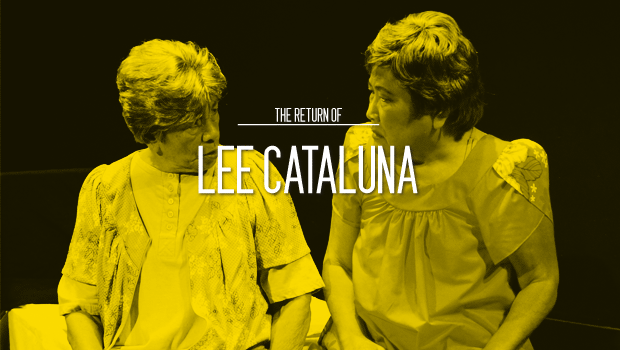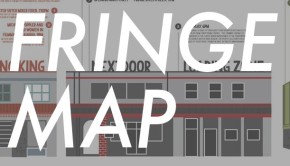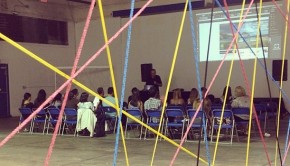‘Carpetner Writer’ Lee Cataluna: On Things
As far as writing goes, Lee Cataluna did it. She’s a playwright—one of her many is Folks You Meet at Longs (Nearly a household name in Honolulu, its book adaptation won her the Hawaii Book Publisher’s Award for Excellence), a 10-year former journalist and longtime columnist for the Star-Bulletin and post-merge Star-Advertiser, and a novelist (see: Three Years on Doreen’s Sofa, published while the 46-year old was in graduate school at the University of California-Riverside earning her Masters in creative writing). Now, she teaches creative writing at Iolani, but her comeback play, Flowers of Hawaii, pictured above with Charlotte Dias and Kati Karoda, opened for its world premiere this week at Kumu Kahua Theatre. Cataluna spoke with us about writing for money, how she walked backward into it, and what it’s like to be a teacher, finally, after doing basically everything else.
On Discovering Playwriting
I was working at KHNL, which was the NBC affiliate at the time. For my job, they sent me to New York City to shoot promos with the Today Show people (Katie Couric, Lauer, Roker). I did 20 minutes of work, sat on the set next to Matt Lauer and said, “Hi, I’m Lee Cataluna! Watch me in the mornings,” yadda yadda. I’d never traveled like that before. I said, Well I gotta go see one of them broadway shows. I thought I was going to hate it, because I’m a frustrated dancer—short, fat, untalented, envious of the dancers. But I went and sat in the audience, and instead of that critical voice who said, “You suck at dancing,” the voice said, “You could write something like that!” It was weird. I hadn’t thought of it. So when I came home from my trip, there was a flyer in my mailbox about playwriting classes at Kumu. I signed up and totally loved it.
On Recognizing a Play’s Success or Doom
Like all things, you have a sense ahead of time—this is gonna be great, or, Oh my God, I’m going to have to leave town. Part of it is, are the actors invested? Are they excited about it? Are they asking those tough questions? Why would my character do this? They start fighting for their characters. That’s an indication. It’s nerve-wracking. I’ve developed this ridiculous habit of being the first to leave a show and hiding in the stalls of the restroom—only getting the women’s perspective, because I don’t have the nerve to go into the lobby. The worst thing is when they don’t talk about the play. If it’s intermission and they talk about work or where they’re going to have dinner afterwards—but if they talk about it in even a negative way, that’s better, because they were affected by it. But if they’re like, “Oooh, I like your dress?” You just never know.
On the Origins of Flowers of Hawaii
Most of [the play] started in grad school. I was dealing with a professor who really frustrated me. She wanted us to write 10-minute plays. I wanted to write a full-length play, but I don’t think she wanted to read that many pages. So my way of keeping my sanity was to write plays that were related. I think of Hawaii as a novel in stories; this is a play in scenes. I was trying to make this assignment that I hated into a play for me. But it does have more of that grad school edgy, experimental tone. I hadn’t really written a play that was so episodic and stretched together.
On Writing Basically Everything
I think of myself as like a carpenter: What do you need me to write? Okay, I’ll write it. How high do you want your bookshelves? Okay. In my heart of hearts, I love playwriting the best. If I could write plays all the time, and somehow feed my family, that would be great. Kumu people are amazing that way; it’s for people who love that.
On Reading, Writing, and Hiding in the Back
I think I’m okay as a reader, but when I see really wonderful acting, I’m always—like Harry Wong has said: You need to spend some time on stage to have that experience to become a better playwright. Just enough to know that my happy place is in the back of the theater, watching. It’s like, a play gets its own life, and it can be weird but it’s really wonderful, too, because you’re not just relying on yourself and your editor to make it good or great. With a play, it’s a truly collaborative art, and the actors bring so much to it. And the directors and designers, and it’s bigger than I could ever have imagined it. One of my playwriting teachers said if you wanna feel like a great writer, get brilliant actors, because they will fill in the holes.
On Knowing When to Let the Actors Act
Once it’s on its feet, once it’s in production, the actors will catch things. Some of the characters from your mind start to have a body. It pays in dividends. There are times when a director will say something to an actor and the actor will do it! It’s magical, it really is, when they find these moments. I’d like to believe that it was all part of my subconscious, but I don’t think I’m that smart.
On Leaving the Star-Advertiser
I left [the column] to go to Iolani, but the headmaster left it open. I felt I couldn’t serve two masters. The time commitment of being at a place like Iolani, being my age and being a new teacher (you should be 24 and I’m 46)—I’m playing a young person’s sport. I don’t think I could write a metro column, because the point of that is to be provocative at times. Nobody wants their kid’s teacher to be provocative. There’s an intensity there that I haven’t experienced in my life.
On Her New Career as a Teacher
I’ve been back a year, teaching full time at Iolani in creative writing. The teaching writing thing is the hardest thing I’ve ever done. I’ve always liked writing, but as a teacher you have to separate it into various parts. You have to say what doesn’t work and discuss why it doesn’t work. It’s super hard! I’m learning to be a teacher.
On What She’s Working on Now
I have a manuscript for a novel that I wrote in grad school that needs shoring up. I thought it was better along. This is my thesis novel; I passed. I have my MFA, but I looked back and went, Oh Jesus. That one needs help. So that’s where my creative energy needs to go. The novel’s not as dirty [as Three Years on Doreen’s Sofa]. There’s no profanity in it. It’s gentler. It’s been described as a cozy, but cozies are sort of a mystery that your grandma would read. The protagonist is not a professional detective in any way. Kind of like the No. 1 Ladies’ Detective Agency. Nobody dies. No naughty words are spoken. I enjoyed writing it as my successful project in college.
But because I’m such a new teacher, all my energy—I gotta tell you how much I hate grading. After all these creative endeavors, the grading is really hard for me. But that discovery that happens together, sometimes I feel like I’m learning more than I’m teaching.









